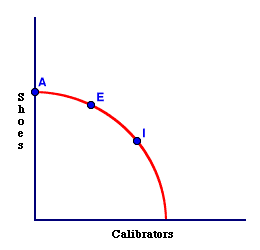
|
|
SATISFACTION: The process of successfully fulfilling wants and needs. A basic fact of life is that people want and need stuff to stay alive and to make that life more enjoyable. Satisfaction is the economic term that captures this wants-and-needs-fulfilling process. Satisfying wants and needs is actually the ultimate goal of economic activity, the end result of addressing the fundamental problem of scarcity, and, when you get right down to it, life itself.
Visit the GLOSS*arama
|
|


|

|
|
Lesson 4: Production Possibilities | Unit 5: Investment
|
Page: 19 of 24
|

|
Investment is the tradeoff between consumption goods used for current satisfaction and capital goods that expand future productive capabilities.- Investment is not just putting money into the stock market. Investment is giving up current satisfaction to obtain greater future production, usually seen as giving up consumption goods to produce capital goods.
- Education and human capital that increase the productive skills and ability of labor.
- Exploration for mineral or fossil fuel deposits that add to land resources.
- Scientific research that expands technology and resource quality.
- The downside of investment is risk. There is no guarantee that you'll get something tomorrow.
Let's consider this basic tradeoff between capital and consumption.- Capital and consumption are the two basic types of goods needed for investment. If we produce more calibrators (capital), then we give up some jogging shoes (consumption).
- This tradeoff IS the fundamental act of investment. In the graph to the right, if we move from bundle A to E to I, we are giving up jogging shoes and getting calibrators.
We are investing!
|
|
|
|
|

|
|
ECONOMIC EFFICIENCY Obtaining the most consumer satisfaction from available resources. In other words, resources are allocated in such a way that consumer satisfaction is at its highest possible level. This is also termed either efficiency or allocative efficiency.
Complete Entry | Visit the WEB*pedia |



|

|
GREEN LOGIGUIN
[What's This?]
Today, you are likely to spend a great deal of time searching for rummage sales seeking to buy either a pair of designer sunglasses or looseleaf notebook paper. Be on the lookout for fairy dust that tastes like salt.
Your Complete Scope
This isn't me! What am I?
|

|
|
A thousand years before metal coins were developed, clay tablet "checks" were used as money by the Babylonians.
|

|
|
"All labor that uplifts humanity has dignity and importance and should be undertaken with painstaking excellence. " -- Martin Luther King Jr., civil rights leader
|

|
SLTX
Sales Tax
|

|
|
Tell us what you think about AmosWEB. Like what you see? Have suggestions for improvements? Let us know. Click the User Feedback link.
User Feedback
|


|


